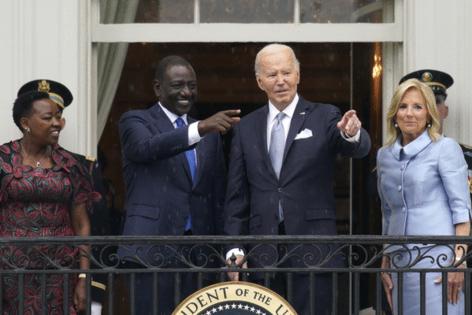US calls on lenders to stop draining funds from poor countries
Published in News & Features
The U.S. laid out a broad outline for helping poor nations ease mounting debt burdens and called on sovereign creditors like China to stop draining funds away from such countries, moves Washington says will free up financing for investments in critical sectors like climate adaptation.
The so-called Nairobi-Washington Vision, announced Thursday during Kenyan President William Ruto’s state visit to the White House, also called on creditor countries to provide more forms of debt relief and for international financial institutions to coordinate their support packages. It also urged creditors to provide more transparent lending, and encouraged more private-sector investments.
As billions in loans to Africa under Chinese President Xi Jinping’s Belt and Road Initiative have gone unpaid, the U.S. has led criticism of Beijing’s lending practices, seeking to cast Washington as a better alternative for financing.
U.S. officials have recently accused China, as well as other creditors including private lenders, of pulling more money out of developing economies in debt repayments than they it’s investing via new money, a situation the U.S. Treasury Department refers to as net negative financing flows.
“A growing number of developing countries’ debt payments to the rest of the world are greater than what they are receiving in new financing,” the White House said in a statement. “As a result, many countries are facing difficult choices between paying back creditors and making critical investments in their economy and people.”
The White House on Thursday called on bilateral creditors to “pledge to sustain positive net inflows by offering debt suspensions, reprofilings or restructurings, or new budget-support flows as necessitated by countries’ debt sustainability and investment needs.”
The statement echoed language from an April speech by U.S. Treasury’s Jay Shambaugh, the undersecretary for international affairs, who called out “free-riding” creditors “pulling funds out of a country” that’s seeking support from multilateral lenders such as the International Monetary Fund.
The White House also announced that it’s making available $250 million in new grant resources for the World Bank’s International Development Association, which supports the poorest countries. Congress in March also authorized the U.S. to lend as much as $21 billion to the IMF’s Poverty Reduction and Growth Trust, which makes zero-interest loans.
The U.S. and Kenya also unveiled a partnership on clean energy, intended to foster cooperation on deployment, supply chains and industrialization. That includes working with international financial institutions like the IMF and World Bank to find ways to mobilize investments and lower the cost of capital for green energy.
_____
(With assistance from Akayla Gardner.)
_____
©2024 Bloomberg News. Visit at bloomberg.com. Distributed by Tribune Content Agency, LLC.







Comments